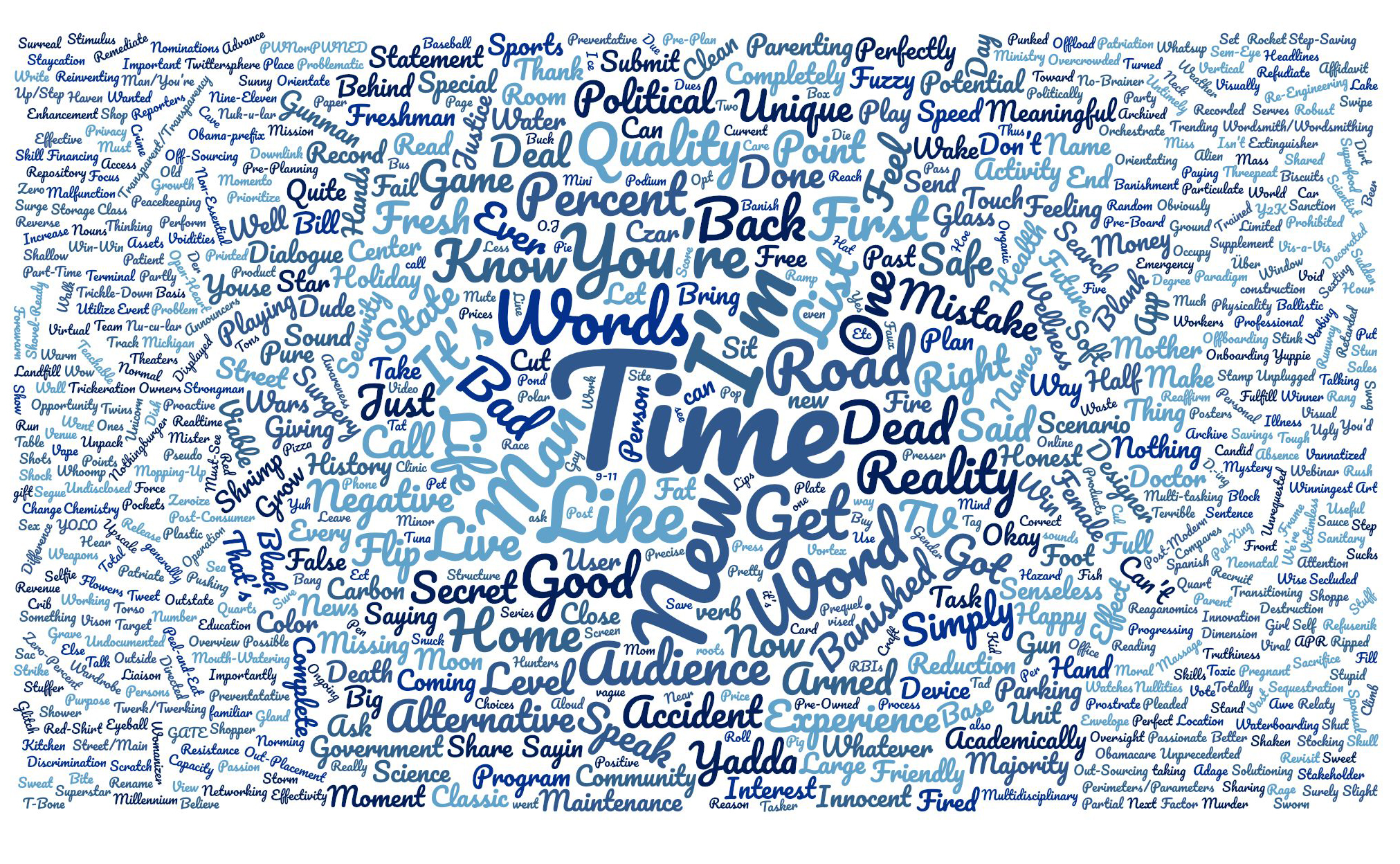Nov 22

The wordsmiths at Lake Superior State University have released LSSU’s 44thannual List of Words Banished from the Queen’s English for Mis-use, Over-use and General Uselessness.
“We grapple, litigate, and then yeet irritating words and phrases gathered from the nominations and votes received during 2018,” said an LSSU-OTUS thought leader from the word-banishment wheelhouse. “It’s the most important election of our time.”
LSSU’s word banishment tradition is now in its fifth decade, and was started by the late W. T. Rabe, a public relations director at Lake Superior State University.
For every new year since 1976, LSSU — also known for premier programs in nursing, engineering, robotics, and Great Lakes freshwater research —has issued this list, firmly tongue in cheek.
Rabe and fellow LSSU faculty and staff came up with the first list of words and phrases that people love to hate at a New Year’s Eve party in 1975, publishing it on Jan. 1, 1976. Though he and his friends created it from their own pet peeves about language, Rabe said he knew from the volume of mail he received in the following weeks that the group would have no shortage of words and phrases from which to choose for 1977. Since then, the list has consisted entirely of nominations submitted from around the world.
Through the years, LSSU has received tens of thousands of nominations for the list, which now includes more than 1,000 entries. This year’s list is culled from nominations that come mostly through a university web site at lssu.edu/banished and a word banishment page on Facebook.Word-watchers target pet peeves from everyday speech, as well as from the news, fields of education, technology, advertising, politics and more. An editor makes a final cut in late December.
And now, the 2019 list, along with reasons for banishment by nominators:
Wheelhouse, as in area of expertise – Chris, Battle Creek, Mich., “It’s not in my wheelhouse to explain why dreadful words should be banished!”; Currie, Ottawa,Ontario (Canada), “Irritating, has become a cliché, annoys me, offence to the English language, etc.”; Kevin, Portland, Ore., “It’s an awkward word to use in the 21st century. Most people have never seen a wheelhouse.”
In the books . . ., as in finished or concluded – Sandy, White Lake Township, Mich., “It seems everyone’s holiday party is in the books this year, and it’s all there for friends to view on social media, along with the photos of the happy party attendees.”
Wrap my head around– Linda, Bloomington, Minn., “Impossible to do and makes no sense.”
Platform– Michael, Alameda, Calif., “People use it as an excuse to rant. Facebook, Instagram, Twitter have become platforms. Even athletes call a post-game interview a ‘platform.’ Step down from the platform, already.”
Collusion, as in two or more parties limiting competition by deception – John, Grosse Pointe Park, Mich., “We all need to collude on getting rid of this word.”
OTUS family of acronyms such as POTUS, FLOTUS, SCOTUS– David, Kinross, Mich., “Overused useless word for the President, Supreme Court, First Lady.”
Ghosting– Carrie, Caledonia, Mich., “Somebody doesn’t want to talk with you. Get over it. No need to bring the paranormal into the equation.”
Yeet, as in to vigorously throw or toss – Emily, Sault Ste. Marie, Mich., “If I hear one more freshman say “yeet,” I might just yeet myself out a window.”
Litigate– Ronald, Fredericton, New Brunswick (Canada), “Originally meant to take a claim or dispute to a law court . . . appropriated by politicians and journalists for any matter of controversy in the public sphere.”
Grapple– David, Traverse City, Mich., “People who struggle with ideas and issues now grapple with them. I prefer to grapple with a wrestler or an overgrown tree. ”
Eschew– Mary, Toronto, Ont. (Canada), “Nobody ever actually says this word out loud, they just write it for filler.”
Crusty– Hannah, Campbellsville, Ky., “This has become a popular insult. It’s disgusting and sounds weird. Make the madness stop.”
Optics– Bob Tempe, Ariz., “The trendy way to say ‘appearance’.”
Legally drunk– Philip, Auburn, Ind., “You’re a little tipsy, that’s all. That’s legally drunk. People who are ticketed for drunk driving are actually ‘illegally drunk,’ and we should say so.”
Thought Leader– Matt, Superior, Colo., “Thoughts aren’t ranked or scored. How can someone hold a thought-lead, much less even lead by thought?”; Paul, Ann Arbor, Mich., “If you follow a thought leader, you’re not much of a thinker.”
Importantly– Constance, Pace, Tex., “Totally unnecessary when ‘important’ is sufficient. ‘More importantly’ (banned in 1992) apparently sounds more important but is also senseless.”
Accoutrements– Leslie, Scottsdale, Ariz., “Hard to spell, not specific, and anachronistic when ‘accessories’ will do.”
Most important election of our time . . .– José, Ozark, Ark., “Not that we haven’t had six or seven back-to-back most important elections of our time.”
Read more about Word Banishment and previous years’ lists, along with a form for submitting words and phrases for 2020. Word-watchers may check the alphabetical “complete list” on the website before making their submissions.
Lake Superior State University, overlooking the St. Mary’s River in Sault Ste. Marie, Michigan, offers extensive real-world learning environments. Its unsurpassed location for research and exploration is surrounded by three Great Lakes, dozens of inland lakes, miles of rivers, and millions of acres of state and national forest. With faculty who are experts in their field, students receive individualized attention leading to outstanding career placement in engineering, robotics, fisheries and wildlife management, nursing and computer science, and more. Lake State is one of Michigan’s most affordable universities, with instate tuition that’s one rate for everyone. Visit lssu.edu for more information.